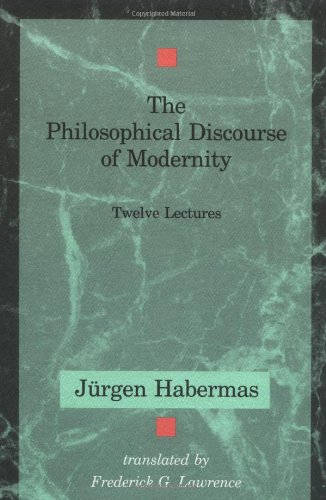The Philosophical Discourse of Modernity book download
Par rathjen edwin le jeudi, janvier 19 2017, 17:37 - Lien permanent
The Philosophical Discourse of Modernity. Frederick Lawrence, Jurgen Habermas, Thomas McCarthy

The.Philosophical.Discourse.of.Modernity.pdf
ISBN: 0745608303,9780745608303 | 456 pages | 12 Mb

The Philosophical Discourse of Modernity Frederick Lawrence, Jurgen Habermas, Thomas McCarthy
Publisher: Polity Press
No one else in the meeting had heard of Habermas. The Philosophical Discourse of Modernity, 1987. This perspective is precisely part of a discourse of modernity that is established in the 19th century in the wake of the Industrial Revolution and becomes dominant in the USA after the Scopes trial in the 1920s. Sign up for LibraryThing to find out whether you'll like this book. The Philosophical Discourse of Modernity: Twelve Lectures. Which has been predominant in the philosophical discourse on virtue. To be captured by Derrida and Habermas in their respective critiques of Foucault (Derrida in the back and forth beginning with Cogito and the History of Madness, Habermas in the Philosophical Discourse on Modernity). Moral Consciousness and Communicative Action, 1990. Thus, on this line of reasoning, in the early twentieth century German philosopher Martin Heidegger theorized modernity as a huge system of “enframing” that reduced things to mere objects and functions available for human use. Scientific reasoning does not sit easily with the presuppositions of any religion, and the work of Enlightenment philosophers made the belief in God appear irrational…It is easy to imagine Mohammed Atta, at Hamburg . Heidegger has no objection to such a rational framework if it is understood clearly to be a technical means (it is perhaps this distinction that Habermas occults in 'Philosophical Discourse of Modernity'). Theodor Ludwig Wiesengrund Adorno (September 11, 1903 – August 6, 1969) was a German philosopher who wrote widely in the areas of sociology, social psychology, aesthetics, musicology, and literary criticism. Just as Schmitt accomplished this objective through the discussion on theology, Blumenberg did so in the philosophical discourse on modernity.